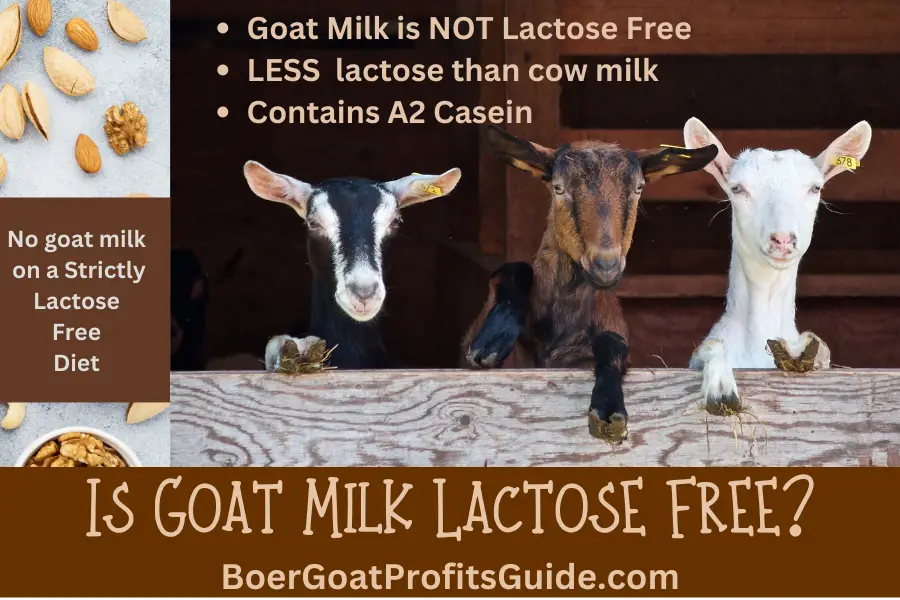
Goat milk has become increasingly popular among health-conscious consumers seeking an alternative to cow’s milk. Many people are drawn to goat milk because they believe it to be lactose-free, a safer option for those who are lactose intolerant. However, goat milk does contain lactose, albeit in slightly lower amounts than cow’s milk.
Though goat milk is not completely lactose-free, its lower lactose content may make it more tolerable for individuals with lactose intolerance. In addition to being an alternative for those who struggle with lactose, goat milk offers various nutritional benefits, including high levels of vitamins, minerals, and easily digestible proteins. It also tends to have a slightly different taste and texture compared to cow milk, which some people may find pleasing.
Table of contents
- Key Takeaways
- Is Goat Milk Lactose Free?
- Lactose Intolerance and Goat Milk
- Nutritional Benefits of Goat Milk
- Dairy Alternatives for Lactose Intolerance
- Goat Milk Products and Digestion
- Table – Relative Level of Lactose in Common Dairy Products
- Health Benefits and Concerns of Goat Milk
- Incorporating Goat Milk into Your Diet
- Video – Is Goat Milk Lactose Free?
- Frequently Asked Questions
Key Takeaways
- Goat milk is not lactose-free but contains slightly lower lactose content than cow milk
- The lower lactose content in goat milk can make it more suitable for people with lactose intolerance
- Goat milk offers nutritional benefits, including a variety of vitamins, minerals, and easily digestible proteins
Is Goat Milk Lactose Free?
Lactose Content in Goat Milk
Goat milk does contain lactose, the natural sugar found in milk products, but it is present in slightly lower amounts compared to cow’s milk. On average, goat milk contains about 9 grams of lactose per 8-ounce serving, while cow’s milk contains about 12 grams of lactose per 8-ounce serving. Although this difference may seem minimal, it can make a difference for individuals with lactose intolerance or sensitivity.
Comparison to Cow’s Milk
When comparing the dairy products goat milk and cow’s milk with respect to lactose content, some important points should be considered:
- Lactose Percentage: Goat milk has a lower lactose content, around 4.1%, while cow’s milk contains about 4.7% lactose.
- Digestion: Goat milk is thought to be easier to digest for some people due to the difference in fat molecules and the presence of lower amounts of the protein casein.
- Lactose Intolerance: For individuals with lactose intolerance, goat milk may still cause digestive discomfort. Though its lactose content is lower, it might not be enough to be considered lactose-free.
It is important to keep in mind that each person’s reaction to goat milk will depend on their individual lactose intolerance or sensitivity. Some people may find that consuming goat milk causes no issues, whereas others may still experience digestive discomfort.
Lactose Intolerance and Goat Milk

Symptoms of Lactose Intolerance
Lactose intolerance is a common digestive issue where the body is unable to fully digest lactose, a sugar found in milk and dairy products. The severity of lactose intolerance can range from mild to severe, with symptoms including:
- Bloating
- Gas
- Diarrhea
- Abdominal cramps
- Nausea
These symptoms usually occur within 30 minutes to 2 hours after consuming products containing lactose. The severity and occurrence of symptoms vary among individuals and typically depend on the amount of lactose consumed and the degree of intolerance.
Goat Milk for Lactose-Intolerant People
Goat milk, while not completely lactose-free, contains slightly less lactose than cow’s milk and can be a suitable alternative for those with mild lactose intolerance. Although it still contains lactose, the lower lactose content in goat milk can lead to less discomfort and better digestibility for lactose-intolerant individuals, including:
- Reduced bloating: The lower lactose levels in goat milk can lead to less gas production in the gut, reducing bloating.
- Easier digestion: Goat milk’s smaller fat globules and higher content of short and medium-chain fatty acids can make it easier for the body to digest than cow’s milk.
However, for those with severe lactose intolerance, goat milk may not be a suitable alternative, as it still contains lactose which can cause discomfort and symptoms. It is essential for those with lactose intolerance to watch their individual reactions and determine if goat milk is suitable for their dietary needs.
Nutritional Benefits of Goat Milk
Goat milk is loaded with essential nutrients, vitamins, and minerals that contribute to a healthy diet. In this section, we will explore the nutritional constituents of goat milk, focusing on its vitamins and minerals, proteins, and fats.
Vitamins and Minerals
Goat milk is a rich source of essential vitamins and minerals, including calcium, potassium, magnesium, phosphorus, and riboflavin. These minerals play a vital role in maintaining bone health, enhancing muscle function, and supporting overall wellness. Additionally, goat milk contains Vitamin A, necessary for maintaining healthy vision, skin, and immune function.
Some key minerals and their benefits include:
- Calcium – supports bone health, muscle function, and nerve function
- Potassium – maintains fluid balance, nerve function, and muscle contractions
- Magnesium – helps with muscle function, nerve function, and energy production
- Phosphorus – supports bone and teeth health, energy production, and pH balance
- Riboflavin (Vitamin B2) – aids in energy production and supports cellular function
Protein
Goat milk is a good source of protein, providing essential amino acids necessary for a balanced diet. The proteins in goat milk are more easily digested and absorbed than those found in cow’s milk, making it an ideal option for individuals with lactose intolerance or cow’s milk protein sensitivities.
Fats
Goat milk contains both saturated and unsaturated fats, important for various bodily functions. The saturated fat content in goat milk is lower than that of cow’s milk, while the amount of unsaturated fat is relatively similar. The presence of healthy fats in goat milk contributes to the maintenance of heart health, brain function, and immune support.
It is important to note that despite the nutritional benefits of goat milk, it is not completely lactose-free.
Dairy Alternatives for Lactose Intolerance
Plant-Based Milks
There are a variety of plant-based milk alternatives available in the market that cater to those with lactose intolerance. Some popular options include:
- Oat milk: Made from whole oats, this milk substitute boasts a creamy texture and mild taste. It is a good source of fiber and vitamins.
- Almond milk: Derived from almonds, this milk alternative is low in calories and offers a nutty flavor. Rich in vitamin E and calcium, it is a popular choice for those avoiding dairy.
- Soy milk: Produced from soybeans, this plant-based milk is high in protein and often fortified with vitamins and minerals. It has a slightly thicker consistency compared to other alternatives.
- Rice milk: Made from milled rice, this beverage is sweet and light. It is often fortified with vitamins and minerals but is relatively low in nutrients and protein compared to other plant-based milks.
- Hemp milk: Derived from hemp seeds, this milk alternative is rich in omega-3 and omega-6 fatty acids. It has a nutty flavor and smooth texture.
- Coconut milk: Extracted from the flesh of coconuts, this lactose-free milk alternative offers a rich and creamy texture. It is high in healthy fats and works well in cooking and baking.
Lactose-Free Products
In addition to plant-based milks, there are also lactose-free dairy products available. These products are made from cow’s milk but have the lactose removed. Some examples include:
- Lactose-free milk: This milk undergoes a process in which lactase is added to break down lactose into easily digestible sugars. It retains the taste and nutritional content of regular milk.
- Lactose-free yogurt: Similar to lactose-free milk, lactose-free yogurt is made by adding lactase enzymes to break down lactose.
- Lactose-free cheese: Several types of cheese have very low lactose content and can be suitable for those with lactose intolerance, such as aged cheddar, Swiss, and parmesan. Some brands even offer lactose-free versions of popular cheeses.
These dairy alternatives make it easy for those with lactose intolerance to enjoy a variety of food and drink options without experiencing discomfort.
Goat Milk Products and Digestion
Yogurt and Kefir
Goat milk yogurt and kefir are fermented dairy products that contain probiotics and live active cultures which can aid digestion. These products are lower in lactose than regular milk, partially due to the fermentation process, which breaks down some of the lactose. The enzyme needed to digest lactose, lactase, is often found in these products, further assisting in the digestion process.
Greek yogurt made from goat milk is especially beneficial because it is strained, which means it has a lower lactose content than regular yogurt. Kefir, a fermented milk drink, contains multiple strains of beneficial bacteria and yeast, making it a good option for supporting gut health.
Cheese and Butter
Goat milk cheeses, such as cheddar, swiss, and parmesan, undergo a process of aging which reduces their lactose content. Aged cheeses contain less lactose than fresh cheeses, as the lactose content decreases as the cheese matures. People with lactose intolerance may find that they can tolerate small amounts of aged cheese.
Some popular goat cheeses include:
- Cheddar: A firm, smooth-textured cheese with a sharp, tangy flavor
- Swiss: A medium-hard cheese with a mild, slightly nutty flavor and characteristic holes
- Parmesan: A hard, granular cheese with a rich, salty flavor, often used grated on pasta dishes
Goat milk butter and ghee (clarified butter) are also options for those with lactose intolerance. Butter has a low lactose content, while ghee has even less, as the lactose-containing whey is removed during the clarification process. Quark is another goat milk product with low lactose content, a creamy, soft cheese similar to cottage cheese or ricotta.
Table – Relative Level of Lactose in Common Dairy Products
| Product | Lactose Content | Suitability for Lactose Intolerance |
|---|---|---|
| Yogurt | Low | Moderate |
| Kefir | Low | Moderate |
| Aged Cheese | Low | Moderate to High |
| Butter | Low | High |
| Ghee | Very Low | High |
| Quark | Low | Moderate |
Though goat milk products still contain lactose, the level is often lower than in cow’s milk products. The presence of enzymes and the fermentation process can make some goat milk products more easily digestible for those with lactose intolerance. However, it is essential to monitor individual reactions and consult with a healthcare professional for personalized advice.
Health Benefits and Concerns of Goat Milk
Digestibility and Allergens
Goat milk is known for its improved digestibility compared to cow milk. This is primarily due to its smaller fat globules and unique protein composition, which can be easier to break down and absorb for many people. In addition, goat milk contains less of the allergenic protein alpha-S1 casein. As a result, it may be a better option for those with a casein allergy or sensitivity.
However, it’s essential to note that goat milk still contains lactose, so it may not be suitable for individuals with lactose intolerance. For those who can digest goat milk, it offers a good source of nutrients, including calcium, phosphorus, and vitamin A, and can contribute to bone health.
Heart Health and Cancer Risk
Concerning heart health, goat milk possesses several beneficial properties. It is lower in cholesterol than cow milk and has a more favorable fatty acid profile, containing higher levels of medium-chain fatty acids, believed to support heart health. Furthermore, the presence of fiber-like compounds may help regulate cholesterol levels.
Research on goat milk and cancer risk is limited, but some studies suggest that the presence of certain bioactive compounds in goat milk, such as conjugated linoleic acid (CLA) and squalene, may have anticancer properties. However, more research is needed to establish a clear link between goat milk consumption and reduced cancer risk.
Overall, goat milk provides health benefits, such as improved digestibility and potential heart health advantages due to its unique composition. However, it is essential to be aware of potential allergens for sensitive individuals and consult a healthcare professional before making significant dietary changes.
Incorporating Goat Milk into Your Diet
Goat milk is a nutritious alternative to cow’s milk for those who experience lactose intolerance or wish to diversify their diet. Although it is not completely lactose-free, goat milk contains lower levels of lactose than cow’s milk, making it potentially easier to digest for individuals with lactose sensitivity.
Recipes and Cooking Tips
Goat milk and its derivative products can be incorporated into various recipes, including both Arab and Italian cuisine. Some popular goat milk-based dishes include:
- Cheese: Soft goat cheese is perfect for spreading on crackers or bread slices. You can also try using goat milk to make homemade cheese curds.
- Desserts: Substitute goat milk in place of cow’s milk in your favorite baking recipes, such as cakes and cookies.
- Savory dishes: Use goat milk for creamy pasta sauces, soups, or stews.
When cooking or baking with goat milk, follow these tips for best results:
- Temperature: Goat milk curdles at a lower temperature compared to cow’s milk. Keep the heat on medium-low when preparing dairy-based dishes.
- Substitution: Replace cow’s milk with goat milk in recipes using a 1:1 ratio.
Determining Personal Tolerance
Before incorporating large amounts of goat milk into your diet, consult with a registered dietitian to assess your lactose needs and stomach’s suitability. Remember that goat milk still has some lactose present.
For individuals looking to determine their tolerance to goat milk, it is recommended to gradually introduce the milk into the diet while monitoring any changes in gastrointestinal issues. Start by consuming small amounts of goat milk and dairy products like soft cheese, then increase the intake depending on individual response to the lactose levels.
Nutrition facts: Goat milk boasts a rich nutrient profile, with bioavailable calcium, medium-chain fatty acids, and essential vitamins and minerals. It is important to note that the fatty acids in goat milk can be more easily absorbed by the body, making it a valuable addition to a balanced diet.
Video – Is Goat Milk Lactose Free?
In less than 2 minutes, this video explains facts about lactose in goats milk and more!
Frequently Asked Questions
Goat milk contains lactose, but it is usually lower in lactose than cow milk. Some people who are lactose intolerant may tolerate goat milk better than cow milk. However, it is essential to remember that individual reactions may vary.
Sheep milk is not lactose-free. It contains lactose, similar to goat and cow milk. The amount of lactose in sheep milk may be slightly higher than in cow milk, but the difference is relatively small.
Yes, all mammal milk, including human milk, contains lactose. Lactose is a natural sugar present in milk that provides energy and nutrition to newborns. However, the lactose content may vary depending on the species
Goat milk contains casein, a type of protein found in animal milk. The casein composition in goat milk differs from cow milk, with goat milk having less alpha-S1 casein and more alpha S2 casein (a2 casein). This difference may contribute to the easier digestibility of goat milk compared to cow milk for some individuals.
Lactose-free milk options include plant-based milk alternatives like almond, soy, rice, and oat milk. Some brands also offer lactose-free cow milk with the lactose removed through an enzymatic process or filtration.
Many cheese varieties have low lactose levels, as the cheese-making process often reduces lactose content. Examples include cheddar, Swiss, and Parmesan. There are also lactose-free cheese options explicitly made for those with lactose intolerance, using lactose-free milk or other lactose-free ingredients.




